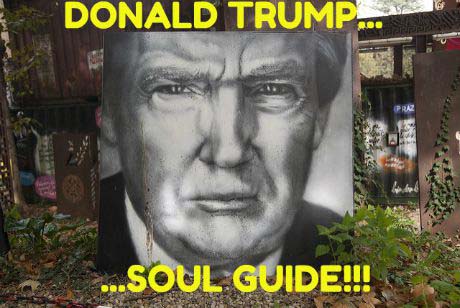Donald Trump, Soul Guide

Probably when you think of the phrase “soul guide”, Donald Trump is not the first person who pops into your mind.

You’re probably thinking that The Donald is not exactly the type of guy that you’d expect to go swimming in those waters, or that you’d expect to engage in a lot of psychological exploration.
Based on what we see in the media, at least, I think we’d have to conclude that such an assessment is probably correct. Yet, there’s a lot that we can learn about psyche and soul from Donald Trump…
The way The Donald acts in his various social and political dealings is very instructive. Let’s start with…
Donald Trump Scapegoats the Weak and Vulnerable
Experience in case studies shows that it can be a wonderful distraction from feelings of anger or alienation or anxiety to blame a scapegoat for all one’s problems. For instance, I can blame illegal immigrants for everything, or engage in blanket condemnation of all Muslims in the United States. Or, I can gain feelings of superiority by mocking the disabled.
It definitely reduces anxiety to turn it into blind hostility and direct it at a specific, definite object. By resolutely refusing to engage in any introspective inquiry into my inner psychological state, I can easily convince myself that the problem is them, not me. If only we take care of the “Muslim problem”, or the “illegal immigrant problem” then things will be fine
So long as we do that, it will mean that we don’t have to face the anxiety we harbour, which might force us to ask some deep questions about our lives. Which might in turn threaten the horrifying prospect of leading to insight and actual psychological growth.
Our Soul Guide Donald Trump Believes He Has NO Personal Weaknesses
As is very well known, The Donald makes it his consistent practice to talk incessantly of himself and his own greatness.
As Jungian Andrew Samuels might tell us, so far as his public self is concerned, Trump seems to completely lack awareness of his own shadow — those parts of himself with which his ego is not comfortable.
Insofar as Donald’s public self or persona is concerned, he shows no desire to know anything about his shadow. He gives the impression that, if he talks fast, hard and long enough about his own greatness, he may never have to confront his weaknesses, and with them, the alarming (yet potentially liberating) awareness of parts of himself that were hitherto unknown…
Donald Trump Tells People What They Want to Hear

Donald Trump achieved success by telling people exactly what it is that they want to hear, even if it has little or no actual connection to what is really the case. Now he imports this people-pleasing behaviour to the realm of presidential politics.
He talks of building an enormous wall along the border with Mexico — but there’s no discussion of the cost. He tells us that he wants to deport all illegal immigrants from the U.S., but he is very short on information as to how such an enormous task would ever be accomplished. He tells us that Muslims in New Jersey danced in the streets after 9/11, but provides no evidence whatsoever for this claim.
By telling people what they want to hear, Donald never has to confront the difficulty of speaking truth to the other that the other doesn’t want to hear. That way, he never has to ask himself what his real values are and stand up for them. In a way, this is much less anxiety producing than standing up for who you really are.
If You Can’t Stand Donald Trump — He May Still Have Something to Teach You
Understandably, many people find such characteristics to be the exact opposite of what they wish for in a soul guide. Yet, from a /a-midlife-transition point of view, maybe there’s a way Trump can be a “soul guide” after all.
If Donald Trump really bothers you, you could ask yourself — what is it that bothers you about him the most? His seeming arrogance? His seeming ignorance? Something else?
Once you’ve done that, you could go on to ask yourself a very hard question: whether there is something, anything that somehow — no matter how grudgingly — you actually admire about The Donald? Because if there is, then it may well be true that there is some part of your soul that wants and needs more of that attribute. And, if you can do that kind of psychological work, so fundamental to case studies, then, in however an unlikely way, Donald Trump, unintentionally, has been a sort of soul guide.
Brian Collinson, Registered Psychotherapist & Jungian Analyst
[cta]

Neall Calvert
An excellent, thought-provoking piece. I am a student of Jungian psychology, and have dreamed about Trump, and wondered why. I came to the same conclusion that you did: He provides parts of my soul that are missing. . . . Just one error: What you say Trump called the ‘dancing Muslims’ were actually ‘dancing Israelis’, photographing the event, which they knew about beforehand. Christopher Bollyn, a seasoned investigative reporter, has covered this in detail (you can also Google ‘dancing Israelis’): it’s a well-known event in truth-seeking circles: http://www.hugequestions.com/Eric/TFC/Bollyn-dancing-Israelis.html